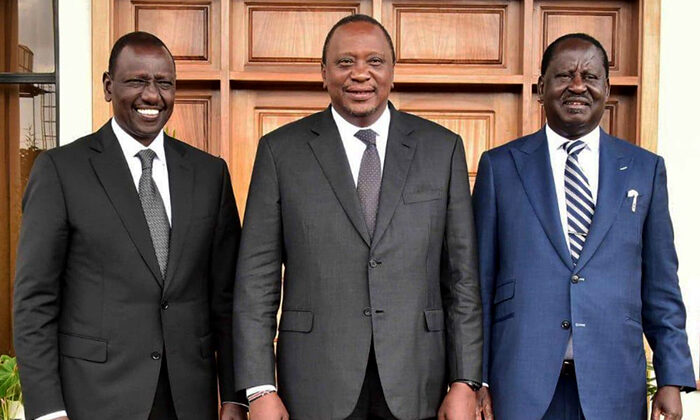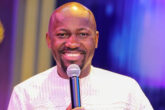
Deputy President of Kenya and candidate for the ongoing presidential election William Ruto (L), President Uhuru Kenyatta (M) and William Ruto’s main rival Raila Odinga (R). COURTESY PHOTO.
On August 9, Kenyans will not only be electing a new president, but also a new parliament and county governors.
But most eyes have been firmly set on the fiercely contested presidential race, which has featured astounding shifts of alliances, a first for women, and even a frontrunner crying in public.
Who is running?
Only four candidates were cleared to run for president out of a list of 17. This is the smallest number since the first multiparty elections in 1992.
The constitution bars incumbent President Uhuru Kenyatta from running again after two five-year terms. But in a surprising move, Kenyatta has thrown his weight behind veteran opposition leader, Raila Odinga, putting an end to a bitter, decades-long family feud between two of Kenya’s wealthiest political families.
Odinga, 77, is vying for the top seat under the Azimio la Umoja-One Kenya Coalition. It is his fifth try after defeats in 1997, 2007, 2013, and 2017. The president’s support could play decisively in his favor. The same applies to his choice of running mate, Martha Kaura, who will become the country’s first female vice president if their ticket wins.
Odinga’s main rival, Vice President William Ruto, 55, is a candidate for the Kenya Kwanza political alliance. He has built a power base among the Kikuyu ethnic community, despite not being Kikuyu himself.
A video showing him shedding tears during a prayer service went viral, pulling at many heartstrings, but also earning him much derision on social media.
The competition between the two favorites is very close, leaving the two remaining candidates, George Wajackoyah and David Mwaure, struggling for the country’s attention.
Who is voting?
More than 22 million Kenyans have registered to vote in 2022; more than half are women.
Voter turnout in Kenya is usually high, reaching 80% in 2017, and voter intention is high this year too, with 93% of male voters saying that they plan to cast a ballot, as compared to 91% of women, according to the mobile surveying platform GeoPoll.
But only 50% of those eligible to vote for the first time have signed up, fueling fears of apathy among youth. In a country where the median age is 20, many young people do not feel represented by the veteran political elite.
Ethnicity is unlikely to influence voters as much as in the past. Neither frontrunner is a member of the largest ethnic group, the Kikuyu, who account for a quarter of overall votes. Most candidates have tried to win them over by naming deputies from central Kenya, which is their traditional homeland.
However, there has also been a deliberate attempt not to focus so much on ethnic politics as this would be seen as not embracing the entire nation.
What are the issues?
As in previous elections, corruption and the economy remain key issues. The fallout from the mismanagement and subsequent ballooning debt of the Nairobi to Mombasa Standard Gauge Railway (SGR), financed and built by China, has been a constant feature of public debate. In addition, the enormous fortunes accumulated by the political elite, including presidential hopefuls, have been a hot topic.
Kenya is East Africa’s main economic hub and has registered strong growth under Kenyatta’s rule but the COVID-19 pandemic, Russia’s invasion of Ukraine, and drought have pushed up prices for food and fuel. Furthermore, a third of the country’s youth is unemployed and the nation is struggling with a major debt crisis. Nairobi owes its biggest creditor, China, $8 billion (€ 7.9 billion).
Could there be violence?
Electoral violence driven by ethnicity has been a constant in Kenya, culminating in the death of around 1,100 people and the displacement of up to 600,000 in 2007/2008 post-election violence. But with the importance of ethnicity receding, hopes are high that no significant violence will ensue in 2022.
Some observers hope that there will be much less ethnic-based violence this year, considering that less emphasis has been placed on ethnicity in the electoral campaign than in the past.
However, many of the female politicians who have dared to stand in the elections this year have already faced gender-based violence and abuse.
What about the international dimension?
Generally, the frontrunners have said little about their foreign policy plans and have rather concentrated on domestic issues during campaigning.
But the stakes are high for the whole of East Africa and also for the West as Kenya is a key partner in the global fight against terrorism and considered an anchor of stability in a region beset by strife.
Under Kenyatta, the country has led talks to broker peace between Rwanda and the Democratic Republic of Congo (DRC). However, tensions are rising over accusations by the latter that the former is supporting the M23 rebel movement, further threatening security in the area.
Western governments hope that a trouble-free election will also enable Kenya to take up its critical diplomatic role in peace talks over Ethiopia again.
The results of Kenya’s elections are expected by August 18. But given how tight the race is, a second round is likely in the presidential poll.
Reporting by DW

